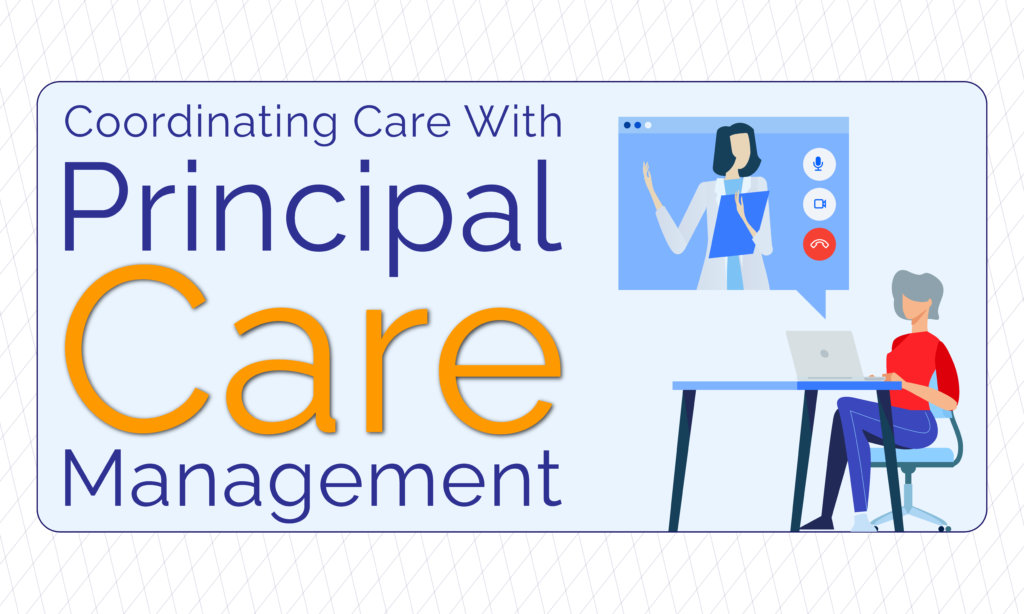Caring for patients with chronic conditions requires good care coordination among providers, especially between the primary care provider and the specialists. The Center for Medicare and Medicaid Services (CMS) has acknowledged the contribution of specialty practices in ensuring chronic care patients receive the focused care they need.
In 2020, CMS created the Principal Care Management (PCM) program for eligible patients and opened the door to specialty practices to participate in its reimbursement program for the care they provide to patients with chronic conditions.
What is Principal Care Management?
PCM is not that different from Chronic Care Management (CCM), which CMS introduced in 2015 to incentivize primary care providers for time spent caring for their patients with chronic conditions. PCM and CCM are similar because they provide continuous clinical monitoring and care coordination. They differ in the number of chronic conditions required with only one complex chronic condition for PCM while CCM has two or more complex and non-complex conditions. To illustrate, PCM is best suited for a patient with uncontrolled hypertension or diabetes or who is considered at high risk due to severe asthma and frequent hospitalization.
The program is created to allow specialists to care for a patient with a chronic condition by treating and focusing care on just one of illness through care coordination with all treating providers. If CCM provides continuity of care, PCM further fills in the gaps, particularly in providing focused care as many practices often see patients with just one chronic disease. CDC says that 6 out of 10 persons suffer from one chronic condition, which means PCM could benefit millions of Americans.
Why PCM is a valuable service?
PCM is a valuable care model for patients, providers, and payers alike. Along with optimizing coordinated care, PCM’s overall value should entice physicians to participate in the program because of the following benefits:
1. Reduces Cost
One of the primary goals of PCM is to address the problem immediately so that the overall care can be returned to the primary care physician. For the patient, this is no small benefit with the cost-reduction involved.
2. Better Health Outcomes
With focused care, providers can prevent or greatly reduce the possibility of a second chronic condition. For the patients, they become equally invested in their care with the close attention and level of care they are receiving. The relationship they develop with their provider helps them to be more participative, accountable, and accurate in following their care instructions. A high level of patient engagement has been known to produce positive health outcomes.
3. New Revenues
Through PCM, specialty practices can also have access to a new revenue stream apart from their traditional billable services in treating one chronic condition. In truth, many practices have been doing this type of work to treat their patients, they just need to obtain the correct information so they can bill for it. This information includes a disease-specific care plan, medication adjustments, communication with other providers, and more.
Providers with a high volume of patients eligible for PCM should consider billing for all their covered care management services.
So how can providers deliver PCM effectively?
PCM is one option that practices can utilize to provide the right kind of support, infrastructure, and monitoring capabilities to ensure a better quality of patient care and obtain a new income for the practice to grow financially.
Here are some helpful considerations:
1. Enroll the right patients
PCM requires one complex chronic condition, but not all patients who have it are necessarily at risk of hospitalization or were frequently hospitalized because of it. Many of the CCM claim denials are due to diagnoses that do not meet the billing criteria or the integrity rules of CMS. This could happen with PCM too. Providers must not bill PCM if the patient has a well-controlled chronic condition.
2. Use the right codes
PCM requires 30 minutes that can be billed monthly. For this year 2022, CMS has discontinued the two Healthcare Common Procedure Coding System G codes and introduced four new current procedural terminology (CPT) codes. PCM now allows for a physician or non-physician provider to perform PCM with CPT codes 99424 and 99425. Clinical staff under the supervision of a physician or other qualified healthcare professional can also do the same with CPT codes 99426 and 99427.
3. Obtain patient consent
Providers must get their patient’s consent to participate in the PCM program, which falls under Medicare Part B. Patients with additional coverage may opt in, but those without may think twice about co-pays. Hence, it is crucial to document patient consent properly to avoid problems in billing.
4. Follow proper documentation
Providers need to document who performed the service and for how long. The time spent should show what kind of care the providers have specifically performed. The good thing about performing PCM is now is that modern EHRs have evolved significantly from 2016 when CCM was first launched. Many have now integrated tools for time aggregation that could make the billing process easier. Before billing, however, providers should ask their EHR vendor if the software supports a care management workflow.
5. Outsource or build your own
Many practices are providing PCM services but are not billing for them. The CMS requirements can be tricky to navigate which provides challenges to consistent billing. Some may consider hiring additional staff to provide care management services like PCM and CCM. More than just the additional manpower, creating the right infrastructure to support these programs requires a significant undertaking and a substantial capital investment. Practices may benefit from outsourcing PCM to a third-party vendor instead.
To recap, PCM has much to offer to patients and providers, particularly specialty practices that can now participate in the reimbursement programs of CMS. Now is the right time to optimize coordinated care for the most high-risk and high-cost patient population.
Why is patient engagement so important in chronic disease management?
Patient engagement is critical in chronic disease management for a number of reasons. First, patients who are actively engaged in their health care are more likely to adhere to their treatment plan and make lifestyle changes that can improve their health. Secondly, engaged patients are more likely to have better clinical outcomes and experience fewer complications from their chronic diseases. Finally, patient engagement can help reduce healthcare costs by preventing unnecessary hospitalizations and ER visits.
There are a number of ways to promote patient engagement in chronic disease management. Providers can start by involving patients in goal setting and decision making around their care. Patients should also be given access to their own medical records and be encouraged to track their progress over time. Education is another key component of patient engagement, as patients need to understand their disease and how best to manage it. Finally, providers should create an environment that is supportive and welcoming, where patients feel comfortable asking questions and voicing concerns.
Entrusting your PCM with ACP
Ascent Care Partners (ACP) is a virtual healthcare service provider with the goal to assist physicians earn deserved income without increasing overhead. We offer turnkey full-service solutions like CCM and RPM with PCM as an important add-on. We provide physicians with the right tools and assets in providing care management services so they will not be burdened by building their own that could be costly and a substantial disruption to their practice workflows. ACP has extensive experience in virtual care management and billing to ensure physicians get paid while they are providing the best care possible to their chronic care patients.



